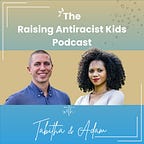We interrupt our series on Antiracist Parenting Under Fascism (be sure to read/listen to Part 1 and Part 2) to recognize joy and be present in our bodies for a second. Today, we’re both existing in the moment and looking to the future as we honor Black History Month. As a multiracial family with Black, Indian, Trinbagonian, white and Jewish ancestry, Black History Month for us is an extension of our ongoing commitment to center Blackness, liberation, joy and power all year round.
This Black History Month is a bit different. This administration is doing all it can to try to invisibilize the power of the contributions of Black people, and to attempt to reduce our impact on, well, everything culturally. Many schools are continuing their education on Black history this month. but some are being cautious. With attacks on DEI and equity programs, somehow celebrating Black History Month has become divisive or harmful to children? Weird.
We know, though, that us parents and caregivers hold a mandate to raise our children with values centered on justice, peace and love. It is essential that we continue teaching accurate history, because if we don’t, history is bound to repeat itself. Equity is being framed as a divisive subject rather than a practice aimed at helping everyone. We’re going to continue speaking the truth. And we’re going to continue to build communities in which family units wholeheartedly reject white supremacy and racism.
Every Black History Month, we remind our kids of a few groundings and we want to share them with you in kid-appropriate language that you can feel free to use depending on the age of your kiddo:
Conversation Starter #1: “Black History IS American history. It isn’t separate from American history. That means that what happened to Black people in this country is important to include any time we talk about the country’s history because it is an essential part of the story of this country”. (Kid Definition Time: history means what happened before today, before you were born and even before I was born).
Conversation Starter #2: “Black history includes more than the ways we suffered in the past. Black people have been through so much in this country, like racism, slavery, discrimination (Kid Definition Time: discrimination is when people are treated badly because of false and unkind beliefs about who they are). BUT Black history also includes all the joys, celebrations, fun and good parts about being Black. So when we talk about Black history, let’s not forget how joyful and beautiful it is to be Black.”
Conversation Starter #3: “Black people are making history right NOW! We are making history by simply existing in our Blackness and in all the wonderful things we do. Black people don’t have to be exceptional to make history (Kid Definition Time: exceptional means to do something big and different and flashy!). We are our ancestors’ dreams because we simply are. So many have told us that we couldn’t be who we want simply because we are Black. But we celebrate us, because we are still here.”
Conversation Starter #4: “We can think of the famous Black artists we know who are making history right now, like Nikkolas Smith and Miles Regis. We can think of the Black musicians we know who are making history right now, like Tyler The Creator, Sza and Doechii. AND we can think of the teachers, activists, and community members we know who are making history right now, like (give examples in your own community).”
Conversation Starter #5: “We celebrate and honor Black history all year round and we do it extra special this month. But it’s super important to honor Black history and Black existence all the time.”
So this Black History Month, we’re doing what we always do, despite its newly controversial status. We’re sharing some of our faves that help us teach our little ones about Black History.
TO READ
Black History Timeline 1954-1968 Read Through History (this link will be in the show notes)
This powerful compilation of books follows history through the civil rights movements. With links to kids books that bring these important markers in time to life, this list from the Indianapolis Public Library is a guide for us as a family through the year. Even if you don’t live in Indianapolis, you can still take this list to your local library.
TO WATCH
Xavier Riddle and The Secret Museum (this link will be in the show notes)
Some parents and caregivers might find it challenging to break down big concepts like race, racism, white supremacy and inequality to our kiddos. It takes some skill for sure (hats off to all the educators who continue to do this). Xavier Riddle and The Secret Museum presents historical lessons through the lens of kids, making learning accessible while maintaining its relevance and power. Check out this series on PBS.
This (this link will be in the show notes) video by Caroline J. Sumlin is a message for us parents who are aiming to raise antiracist kids. Many parents (we’ve done it, too!) have used the phrase “because of the color of our/their skin” when explaining racism. Sumlin explains why this is problematic and what to say instead.
TO DO
These are only three of many educational institutions that teach about Black History.
Visit the National Museum of African American History and Culture in Washington, D.C. We took our kids to this museum last year and we were delighted to find activities for their ages that taught them about their heritage in ways that were fun, interactive and kid-appropriate.
Take a trip to the African American Museum in Philadelphia. When we visited, our little ones found the exhibit on the Green Book to be particularly fascinating. It was educational for our kids, who have only lived in a certain part of the country, to see what life was like as a Black traveler and to witness the reality that not all places were safe for Black people because of racism (including sundown towns). There are still parts of this country that we cannot visit because of this.
Explore the Rosa Parks Museum at Troy University in Montgomery, Alabama. It’s one of the most engaging museums we have been to with our children. Not just history museums, any museums. Period. It is an interactive and innovative multimedia experience. When we went on our Family Civil Rights History Road Trip, our kids had a blast while learning a lot. Look out for the interactive bus experience that is sure to bring kids’ learning to life. .
TO PLAY
Adam made this game up a few years ago and the kids love it. It’s a fun twist on Jeopardy. We often do this on Shabbat evenings when we sit and eat dinner together as a family and talk about our weeks. We pick a few categories that we all love e.g. princesses, anime, fashion. And then we toss in a category related to social justice. For Black History Month (and always), add a category related to Black history e.g. Black musicians or Black artists. This is a sly little way that we teach the kids historical facts through a fun lens. Try it and let us know how it goes.
This Black History Month, we are determined more than ever to teach our children that, no matter who is in power in the country, they hold power in their homes, schools and communities. They hold the power to exist proudly in their Black skin, to be Black children and to center Blackness in their experiences.
That’s it from us for the moment. Dive into the resources we shared and let us know which your kids are loving. Take good care of your heart, your kids and your sanity, ok? We got us.
Tabitha & Adam










